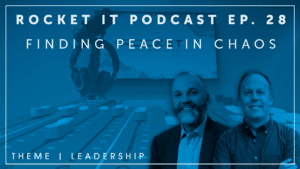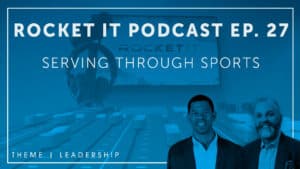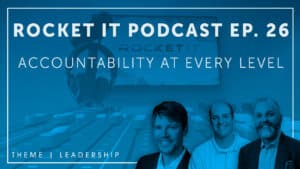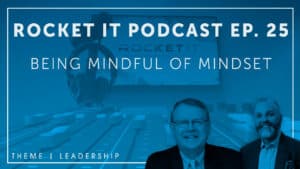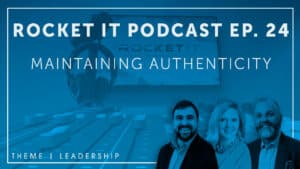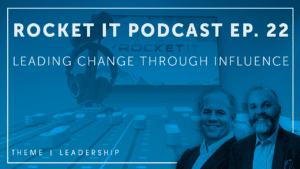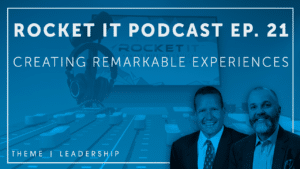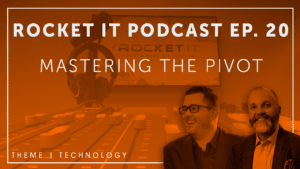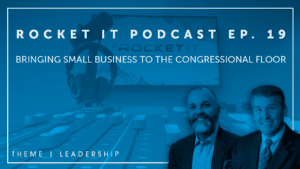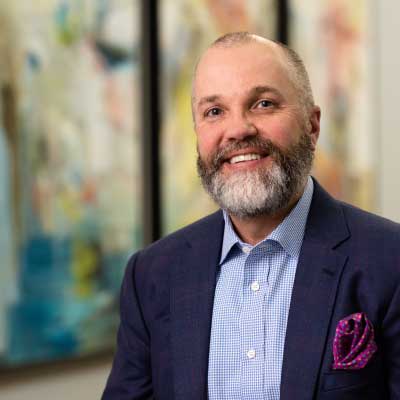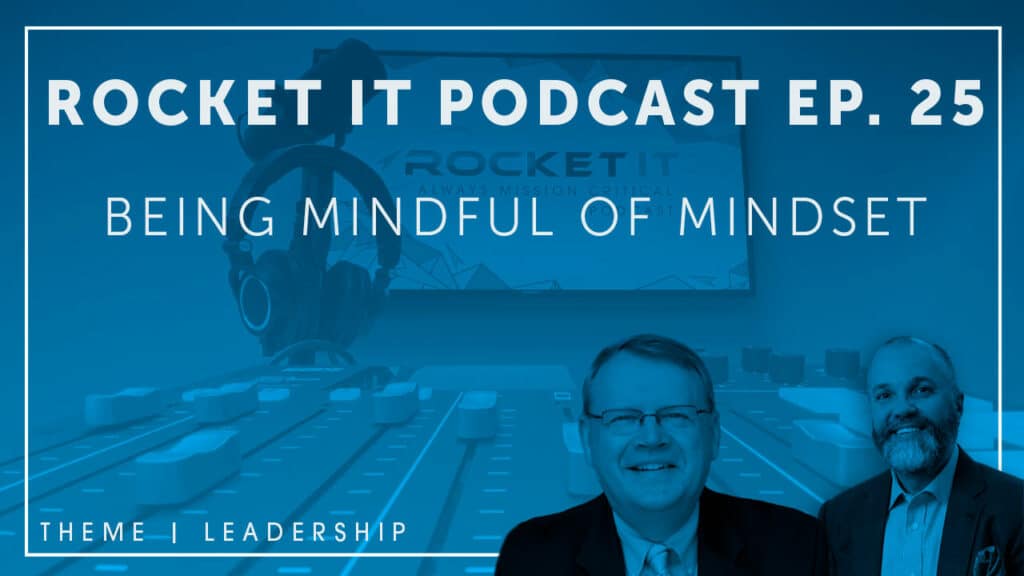
Rocket IT Business Podcast | Bill McDermott | Being Mindful of Mindset | Ep. 25

With over 40 years of banking experience under his belt, Bill McDermott made the shift from business banker to consultant after life through him a curveball. In this episode of the Rocket IT Business Podcast, Bill provides audiences with the key steps every business should consider when attempting to accommodate the current needs of the marketplace.
In this episode, you’ll hear more about:
- How business owners can become better financial managers
- How to make the transition into entrepreneurship
- Why it’s important to delegate tasks as an entrepreneur
- Maintaining a competitive mindset while operating a business
- The importance of succession/exit planning
- The long-term benefit of documenting all business processes
- How to minimize entrepreneurial risks
- Pitfalls to avoid when building a business
- Barriers to break through for business growth
Contact Information
Bill McDermott | 770.597.3136 | Bill J McDermott on LinkedIn
Resources Mentioned


Host: Matt Hyatt Guest: Bill McDermott
Show Transcript
Music: (00:14)
Matt Hyatt: (00:15)
Hello everyone. And welcome to episode number 25 of the rocket it business podcast. I’m your host, Matt Hyatt. And today we’re talking with my friend and financial expert, Bill McDermott over 40 years, 40 years, Bill forty years of banking experience under his belt Bill made the shift from business banker to consultant after life threw him a curve ball. And today we’ll learn how Bill has built his practice and adopted, adapted to the needs of the marketplace. Bill has a great story. I’m looking forward to hearing it some keen insights and I’m excited to share with our audience. So I’m going to jump right in and Bill, welcome to the show,
Bill McDermott: (00:50)
Matt, Thanks so much. It’s a pleasure to be here. Excited about our talk today.
Matt Hyatt: (00:54)
Yeah, absolutely. So Bill, tell us a little bit about yourself. I want to hear a story. I know I came from a banking background, but you’re an entrepreneur like me. And so we have a lot in common. I want to hear a little bit about your story and how you arrived at the entrepreneurial doorstep.
Bill McDermott: (01:11)
Yeah, so it’s a, it’s my story. So of course I think it’s a great story. But 12 years now as an entrepreneur, I was not an entrepreneur by choice as having spent 32 years in the banking industry, the great recession hit and I was the chief commercial lender at a community bank. And the bank said, Bill, you’re doing a great job, but we’ve got to cut costs. And you were the last one in, so you’re the first one out. And so at that point we had two daughters in college, had a mortgage to pay and I had to figure out how to reinvent myself. So had a, you know, had a little conversation with, with the man upstairs and said, uh, well, you’ve closed the door. How about opening a window? And
Bill McDermott: (01:58)
By the way, would you put a little neon around for me so I could see it.
Bill McDermott: (02:02)
And so that launched a great adventure of helping business owners become better financial managers. I saw in my banking career that generally business owners were great salespeople. They were great client delivery or operations people. Just about every CEO I met really struggled with the financial aspects of the business. They don’t teach it in school and there’s no on the job training. You know, when you’re the CEO.
Matt Hyatt: (02:33)
Right.
Bill McDermott: (02:35)
In my banking career. Also if I take it back all the way to the beginning. So I was the repo man for a bank auto dealer department, coming out of wake forest with my high powered undergraduate degree. And at that time, banks believed that you had to learn how to collect loans before you learned how to make loans. And so I had a, I had a, tow tow bar. I can’t remember what you call them, but anyway, I had a, I was the repo man.
Matt Hyatt: (03:10)
Wow. So you’re the heavy they send out to the field to pick up these cars that were moving at pace.
Bill McDermott: (03:13)
You know, I don’t, I didn’t really command much of a physical presence one year out in school. And plus I was newly married. So my wife thought she was going to be the youngest widow ever, but we survived and I did my best to collect those, collect those past due car loans. I have some stories,
Bill McDermott: (03:35)
But, but, but I don’t think your listeners would really be that interested in
Matt Hyatt: (03:39)
I don’t know. We could go a whole different path here than what we planned. That’s pretty interesting. So I actually, I don’t know that I remember that we have something in common there because I sort of started my career as a bill collector. I was a bill collector for JC Penny, back in the day. I didn’t have to go knock on any doors or see anyone in person everything was done on the phone. But what I found was, so my approach was Mr. Nice guy, you know, I’m here to help solve your problem and let’s see if we can work through it’s a payment plan or whatever. And what I found was that was actually very helpful and
Matt Hyatt: (04:15)
Sort of the,
Matt Hyatt: (04:18)
What’s the word I’m looking for, the training, the care and feeding of Matt Hyatt, you know, young professional, and just learning to work with people through difficult conversations.
Bill McDermott: (04:28)
Yeah, my clients tell me that I have a fair amount of empathy. And so I, I recall early in the days I tried to take, yeah, you catch more bees with honey than vinegar. And so why not try to put yourself in that person’s situation, understand what their circumstances are, what they can do, what they can’t do. Have reasonable expectations. I mean, let’s agree. Banks don’t want to repossess cars. And so the reality is allow that person to continue to use the car function in their life. Figure out a good solution that creates a win-win for both parties.
Matt Hyatt: (05:11)
All right, there you go. So I remember the financial crisis and some ways it feels like it was a long time ago. And in other ways it feels like it wasn’t that long ago, right?
Bill McDermott: (05:22)
Yeah, that’s for sure.
Matt Hyatt: (05:22)
Twelve years, right? It goes by fairly quickly. But I do remember one particular experience of going in a, there was a job fair career fair that was happening was probably 2008, maybe mid to late 2008 and arriving at this career fair. We had a booth, right? We were looking to hire and recruit young tech talent really, but just being shocked at the number of suits lined up outside the door to get into the career show. And it was, it was a very scary thing. A lot of people unexpectedly lost their jobs and that, and you’re absolutely correct. I don’t think it was unique to you. There were a ton of folks that, we’re not talking about entry-level employees necessarily we’re talking middle level and even high level executives, fun, fine. Suddenly finding themselves without a job. This was a scary time. So you taking the initiative to say, okay, I’m going to reinvent Bill McDermott, and now I’m going to be an entrepreneur. It was a brave thing, but we, we get a lot of courage when we’re forced to. Right.
Bill McDermott: (06:38)
What did they say? Necessity is the mother of invention.
Matt Hyatt: (06:41)
Yeah, exactly.
Bill McDermott: (06:42)
I think the other thing too, Matt is my dad was a banker. He was a career banker, but his career did take a turn at one point in time where he had an opportunity to get in on the ground floor of a sucessful finance corporation. But I think at that point in time, I held onto the belief that if you work really hard, your company is going to take care of you because I saw how companies took care of my father.
Bill McDermott: (07:15)
The other thing is, I think there is
Bill McDermott: (07:18)
A, there is a path that we seem to gravitate towards, which is go to college, get a degree, be a successful professional, work really hard, and you’ll have the ability to retire one day and then you can do what you love. And so in looking back, I bought into that dream, but that was not my dream. I believe at 54 years old, with 32 years of banking experience, I was destined to launch my own business. So believe it or not for any listener out there at 54, I started a business from scratch. You can actually do it anytime that you want to. Yes, there are risks involved, but that was the start of living my dream, Matt because what I had seen for years in banking, as I mentioned, business owners, struggle with how to improve cashflow, how to improve profitability, how to grow their business.
Bill McDermott: (08:33)
How am I sure that I have a well conceived strategy where I’m clearly differentiating myself in the marketplace? How am I doing at establishing processes so that I’m not having redundancies in my organization? How am I executing? Am I effective as well as efficient and then cash, you know, how do I create cash in my organization? Can I collect my money faster? Can I increase my revenue? Do I need to increase my prices? And that’s something, you know, I certainly tip my hat to you as a successful CEO of a 25 year business. I believe it’s, it’s roughly 25 years. You have seen a lot, but yet you have, have built a business and really, you know, beat the odds. Most 80% of businesses fail in the first five years. So, so 25 years, it’s not only a credit to you, but also a credit to the team that you built.
Matt Hyatt: (09:32)
Well, thank you. Thank you very much. Well, you know, it’s funny you say, you’re talking about building your business and starting a business at 54. Like I said, that does take quite a bit of courage. And I think for a lot of folks, it’s tough to make that sort of scary decision without some sort of pressure to do it right, because there’s some comfort and safety and what’s known and certainly an entrepreneurial venture. Is there a lot of unknowns? So for that, I am curious though, I remember talking with you when you were planning to start your business way back in the day and you had a business plan and you had an idea of what you wanted to do. How does that compare that plan that you wrote 12, 14 years ago to the one that you’re actually executing now?
Bill McDermott: (10:25)
Yeah, actually it’s different. That’s a great question. So when I started in the great recession, I was really focused on businesses that were actually in trouble. There actually is a department of the bank called the special assets department. S A D
Bill McDermott: (10:46)
Yeah. So you’re sad if you’re in that department, but, uh, yeah. Well, and
Bill McDermott: (10:53)
So they’re special because there are special risk with those businesses. And so excessive risk banks, banks run their business based on risk. And of course the economy dealt all of us, uh, a blow. So my first business was actually, negotiating banking plans for businesses that were in special assets and then finding them financing. So quick story, I was actually speaking at the Southeast accounting show to a group, CPAs talking about something called forbearance agreements. Forbearance agreements were very common back then because the bank didn’t want to liquidate a business, but there was a default on the loan. And so you go into forbearance because the bank is delaying declaring a default. And so I had a CPA that said, you know, raise their hand. I have a client that’s about to sign one of those. Can you help? And so what led there is there was a business retail business, five locations, only two of them were profitable, $16 million in debt.
Matt Hyatt: (12:09)
Wow.
Bill McDermott: (12:10)
Because they owned the real estate on all the locations. So actually over a three-year period, we negotiated $16 million down to a million. We had two short sales, both were approved by the lender, but that last million dollars, they actually, the bank drew a line in the sand. We’re not going to renew it. You have to pay it. We couldn’t pay it. And so the only alternative was bankruptcy. Well, nine months later, the lender said, yeah, look, uh, pay us 10 cents on the dollar. And we’ll settle. So out of that million dollars, they were able to scramble and write a check for a hundred thousand dollars.
Matt Hyatt: (12:52)
Wow.
Bill McDermott: (12:52)
They had negotiated $16 million of debt down to zero. And also we’re left with two profitable locations with no debt having eliminated all the debt on the other three as well. So I did a lot of that.
Matt Hyatt: (13:08)
Wow, yeah.
Bill McDermott: (13:09)
And so, but what I found is once you help a business owner like that, they want you as part of their team. So I started something called the monthly financial review. They wanted me to coach them on their business. And so what I did was actually take the financials, look at the trends. How are they doing as far as liquidity, are they collecting their receivables, well, turning their inventory. If they have it, are they generating cash?
Bill McDermott: (13:44)
How profitable are they, are the trends positive or negative? And why? Are they leveraged? Is the amount of debt relative to the amount of equity in the business high or low. And then the last thing was really just understanding how they were, yeah. How many cash on hand sure. That they had as well. So the monthly financial review morphed into what I am today is the profitability coach. And so from negotiating banking plans and finding financing, I still do the finding financing. That’s about half of my business. It’s difficult to borrow money from a bank if you’ve never done it before. And so I help businesses find financing. And then I also do the profitability coaching. So about 50 50 mix roughly. And it changes depending on the economy, but the economy is really moving right now. I have quite a few clients that are making significant capital investments, equipment, real estate buying. And so, financing is an important part, but also just teaching those business owners how to be better financial managers and how to have the profitability in their business is really what I’m passionate about.
Matt Hyatt: (15:04)
Right. I love it. So there are a lot of things that you said they’re going to think that are interesting and worth diving into a little bit, but one is that while it’s probably important to sit down and think about what a business might look like before actually launching one and a business plan is probably not a bad idea. I’ve found that it is absolutely worth doing some pathfinding. Once you’ve launched the business to find the, what the market really needs and what we’re good at, right? What are we capable of delivering and what, what the folks actually want to pay for and buy. Right. And so, and part of it is probably just, what is the state of, of the marketplace? You know, back when you started, there were a lot of folks that were facing bankruptcy or parents, by the way, forbearance deferment of payments. Isn’t that how that works? We’re not saying, Hey, you don’t have to pay. We’re saying you have to pay, but we’re gonna, we’re gonna delay coming after you.
Bill McDermott: (16:09)
Correct.
Matt Hyatt: (16:09)
Essentially. So back to being able to pivot, I think is a really important trait and capability for any entrepreneur and any business needs to be looking for. Where’s the opportunity, where are my interests? What do I think that I’m good at? And what does the market want?
Bill McDermott: (16:28)
Yeah. So as you’re mentioning that two things come to mind in my experience, first, I believe it takes a village to get started. There were, there were many people that I talked to one person suggested to me, there is a great book by Michael Gerber, it’s called the E-Myth it, that book encourages you to build a prototype for your business. And so to your point, having a plan is important, even though my plan changed, Gerber’s book, I think really guided me on creating my version of a business plan, because it causes you to focus on things like, well, why am I starting this business? You know, Simon Sinek says, know your why, and also what is it going to take as far as resources, people, time and money. And I think the other thing I’m going to take a page, you remember Jim Collins, his book.
Bill McDermott: (17:31)
Good to great.
Matt Hyatt: (17:32)
Sure.
Bill McDermott: (17:33)
So Collins asserts that good is the enemy of great. And in order to be great, you really have to look at three circles and then determine where those circles meet. So the first circle is, what am I passionate about? I’m passionate about making business owners, better financial managers. I love to see them have the, the business of their dreams. What am I, what am I best in the world at? My clients tell me I’m a pretty good listener. And so listening to things and having the ability to connect the dots either in strategy or the dots in execution is, is what my clients tell me I’m, I’m really good at. And then the third thing is what drives your economic engine? So how do I take making business owners, better financial managers and being a good listener? Well, that’s consulting in a nutshell. Consultants help business owners. And of course, coaches not only help business owners, but also, you know, they not only provide the fix, but they can actually walk the client through the fix as well.
Matt Hyatt: (18:51)
Right. I’ll tell you all the books that you mentioned are they, they’re sort of foundational for a lot of entrepreneurs, a lot of great material on all three of those books, like you, E-Myth was foundational for me. One of the things I love about E-Myth was the idea that you would sit down and really think about all the different hats that you wear in the business. You know, for those of us that have bootstrap businesses, I think you and I fall in that category early on, you sort of figure out, wait a second. You know, I got into it because I have an affinity for computers and technology. Right. I like, and like that. And, you know, got, got to the point where I had some skills in that area. So I was the technologist. Well guess what, you’re not going to actually sell anything, unless you go talk with some people that want to consume technology services.
Matt Hyatt: (19:47)
And so you wear the sales person hat. Well, I guess I probably should do some marketing around that. I needed to, you know, have business cards, printed a need to go to some chamber events and join some civic organizations. So I’m wearing the marketing hat. Yes. I also need to be an accountant so I can get my invoices out and figure out what to do when the checks arrive or don’t. So all of those things are various roles in our business. And you know, when you and I started, I think we were both in the same boat.
Matt Hyatt: (20:19)
How many people work, work at rocket IT? Well, there’s three: me, myself and I, yeah. We ended up doing all of those things. And then the key would be that over time that we could hire experts in these various functions, whether that’s internal team members or external teams to come in and help with those things. And that was just super helpful for me on E-Myth to sort of, Hey, okay, here’s, how I’m going to eventually get some of these things off of my plate so that I’m not doing all of those things, but you’re right. We don’t probably, we probably don’t enter those things. I don’t know. Maybe, maybe you had the experience. I didn’t have, you know, how, how do I actually sell the service that I’ve created and how do I build my skillset around sales? Probably the biggest one for me. And it’s an ongoing project is how do I lead people effectively?
Bill McDermott: (21:16)
Right.
Matt Hyatt: (21:17)
That’s not something that I learned coming up through bill collections or in my education, those things you had to sort of figure out and of course, books and videos and today podcasts and YouTube all help in that area.
Bill McDermott: (21:35)
For sure. Yeah, no question. And I think the CEO just starting out has to be all things because you’re right. It is me, myself, and I. Kind of reminds me, I’m working with a professional services firm. It was a one person firm. Now it’s a three-person firm. The lead owner has done a fabulous job. Building revenue revenue has doubled in the last 12 months just having a fabulous time, including COVID. And so, but to her detriment, she has a hard time letting go. Delegation does not come natural to her. And so, you know, all of us have those little tapes that play inside our heads that say, if this is going to be done right, I have to do it myself. And so part of this is having the mindset of being willing to delegate. Interesting fact, only 3% of companies make it beyond 10 million in revenue that have ever been started.
Bill McDermott: (22:54)
You know what, the number one reason is why they don’t get beyond 10 million?
Matt Hyatt: (22:58)
No.
Bill McDermott: (22:58)
Delegation,
Matt Hyatt: (22:59)
Really.
Bill McDermott: (23:00)
And so I found early on, I tend to be a big picture person. I’m very strategic. You put me in something that requires details and I really struggle.
Matt Hyatt: (23:15)
Right.
Bill McDermott: (23:16)
And so one of the first things that I did probably after about a year in business is I found someone who is incredibly good at details who handles all of those flawlessly. As a matter of fact, it is her strength. And so I’ve found that, and I’m sure you have too, in your experience, you certainly find people to surround you that are really good at what they do. And sometimes that person that you’re delegating to can do that task so much better than you can.
Matt Hyatt: (23:53)
For sure.
Bill McDermott: (23:54)
And it’s actually fulfilling to them to do it because that’s their strength. And so the whole concept of, of building your team, finding the strengths in each person in your organization, and then playing to those strengths and then being willing to let go of those things to feel no one is going to do this the same as I’m going to do it well, guess what you know they can do it better. And so that’s something I’ve found that sometimes unintentionally a CEO can be the choke point in their own organization, which is causing some inefficiencies as well as some ineffectiveness.
Matt Hyatt: (24:38)
I love it. You’re absolutely right. I can think of a number of examples in my past where, you know, there have been tasks that either are my responsibility or the responsibility of one of our other team members and you realize, oh my goodness, not only am I not maybe the very best person to be doing these things, but I’m actually finding that that’s a draining activity. That is a very taxing activity. When there are other people that may be wired just a little bit differently that they might gain energy from doing those things. We can find the folks that are interested and engaged in those activities. Then everyone’s better for that.
Bill McDermott: (25:19)
Creates a win-win.
Matt Hyatt: (25:20)
Absolutely. Absolutely. So kind of going through some of the things that we’ve talked about in the past. One of the things that we’ve discussed is just how do you figure out when and how much to invest in your team members?
Matt Hyatt: (25:35)
Because once, once we’ve hired somebody and brought them in, we all want to grow as a, as professionals and grow in our skillset and we want to be able to, grow careers. So how do you make that choice? What’s the, what’s the balance between, okay, I need you focused on doing the things that we agreed that we’re going to spend our time on versus, okay. I need to put that aside and we need to go spend some time learning something new or expanding our skill set in a certain area. How do you make that choice about when, when to make those investments?
Bill McDermott: (26:11)
Gosh, that’s, that’s a great question. In my experience, I’m, I’m thinking of a, another professional services firm who there was a change at the top and this particular firm didn’t really have an effective business, you know, outfacing business development effort. So that was incredibly critical. But the other thing to this point is they also didn’t have a ongoing talent development initiative. And so what this CEO did was really first adopt the CEO mindset. In other words, I’ve got to spend some thinking time outside of all my other CEO duties to do this. And so speaking to when do you invest in talent? I think really from the start, part of an interview process, in my opinion, might include understanding what those, that person’s strengths are or what their gifts are. Getting back to Jim Collins, his book, what are they passionate about? What are they best in the world at? And so finding out what those strengths are and employing them in the organization, I think really from a very early point, yes, the work has to get done. They’re accountable for a task or a function inside that organization in order to make the organization run. But I think it’s equally important to have a talent development and a talent management strategy.
Bill McDermott: (28:06)
And part of that strategy I think is, is from, from the CEO standpoint, excuse me, not the CEO standpoint from the employee standpoint, they really need to know the organization and the CEO, the management team at the top really cares about them. People don’t care how much, you know, until they know how much you care. Right. And so I think part of that is really understanding what is that person’s strengths? How do they, how do you get them in a position to leverage those strengths and then guess what, you know, strengths develop and additional strengths also develop. You mentioned earlier leadership. Leadership is something that is often missed in organizational development. I’ve seen a lot of organizations that have really great managers, but don’t have a lot of leaders. You know, my definition is managers manage a process, but leaders have vision. And so the ability to see things in your mind’s eye, you know, the mind is a powerful thing.
Bill McDermott: (29:19)
What we, what we see in our mind we tend to bring about. And so I think talent development is so critical. And I think it’s certainly an ongoing process. I think first it’s important to have a strategy. There needs to be people accountable in the organization for, for executing that strategy. And then think there needs to be metrics in place, whether it be an employee satisfaction index, whether it be having a suggestion box, leave it up to the, to the management team to decide. But I think talent management is critical. This professional services firm that I mentioned has been going at their program for about three years now, their revenue’s up 10% has been consistently up 10% for the last three years. They’ve added head count. I want to say their head count is probably grown 10, 15%. And they have a not only a surviving, but a thriving culture because of it.
Matt Hyatt: (30:25)
Right. I’ve heard you talk before about growth mindset versus fixed mindset. What, what do you mean when you talk about that?
Bill McDermott: (30:31)
Yeah, now you’re, you’re getting on a topic that I really love to talk about. So I’ll start with a story. So I’m dating myself here a little bit, but Michael Jordan was a famous basketball player and he played at the university of North Carolina. And when Carolina won the NCAA title, Jordan hit the winning shot and he was interviewed after and he said, the interviewer asked him. So right as you were taking that last shot, what were you thinking? And he answered the question. He said, what I was thinking is I can’t see myself missing. Well, the interviewer took that as an incredibly arrogant comment. He misunderstood because of what Jordan was saying in my mind’s eye. I saw the ball going in before I took the shot. So mindset. So another book, I’m a big reader Matt. So Carol Dweck writes a book called mindset, and essentially there are two mindsets, a fixed mindset and a growth mindset and a fixed mindset is, comes from a place we’ve been given all of the abilities, all of the tools that we need at birth.
Bill McDermott: (32:05)
And so it’s basically the concept that leaders are born and not really made, but a growth mindset is someone who doesn’t really believe that they can be limited by just the skills they have today. They can grow and adapt and develop new skills, new talents, and grow throughout there as a person, as well as, as a professional through the years. So it’s a mindset that I have. I’ve never finally arrived. There’s always more things that I can learn. I can do this a little better. Yes. Tomorrow than I can today. And I’m committed to making gradual continuous improvement. And so the mind is a powerful thing. So I was, as a young teenager, I was playing golf at country club in suburban Chicago. And I came to this tee, the fairway Matt was lined with trees all the way up, both sides of the fairway.
Bill McDermott: (33:19)
I’m looking at this, I’m getting ready to hit my drive. I am almost paralyzed with fear. There’s no way I can hit this shot. And so I had an adopted uncle. His name was uncle Stan, and I was Billy back then. He said, Billy, the widest fairway is only six inches. I looked at him. And so he said, yeah, the widest fairways only six inches. And he was pointing from one side of his, his head to the other. In other words, it’s all in your mind.
Matt Hyatt: (33:51)
Right.
Bill McDermott: (33:51)
And so what I believed then as well as now is we all have self limiting beliefs that we can’t do something, but having a growth mindset is really about breaking through those self limiting beliefs and really being the person that you were meant to be. And so, as you can tell, I do a lot of reading.
Bill McDermott: (34:17)
I, I believe I have a growth mindset. Certainly I am most effective coaching business owners that also have a growth mindset because they always believe that they can do things a little bit better, make the environment a better place to work at for the benefit of their employees. And, and so that’s really what, uh, what a growth mindset is. I can learn more, I can become better. I can do more and I, I can be more fulfilled and more satisfied. And that’s really what I found when I launched my business 12 years ago. If I, if I had finished my career as a banker, I certainly would have been happy, but I’m not sure I would have been as satisfied because for the last 12 years now, certainly there’ve been bumps along the road. So I don’t want to minimize that. But gosh, it’s felt like a lot of tailwinds,
Matt Hyatt: (35:22)
Right.
Bill McDermott: (35:22)
It hasn’t, it’s just flowed. And when you love what you do, it just has a way of lifting your spirits. I told my wife, when I first started the business, man, everyday feels like Christmas, and I’m about to open a present. And so, so that’s, that’s really what a growth mindset is about.
Matt Hyatt: (35:42)
I love it. You know, as you’re kind of talking through that and previously about the investment in people, I began to sort of think about what, how does that play into the long term plan for every entrepreneur and when I mean long, I mean, very long, most of us when we start our businesses, we’re thinking about the near term future. How do I get through the first month?
Bill McDermott: (36:14)
Yeah.
Matt Hyatt: (36:15)
How do I make payroll through the first year? What do I hope my business looks like two or three years from now. There’s probably less emphasis at least early on in what happens 10, 20, 30 years down the road. And what I’ve seen over and over again from my friends and acquaintances that have started and ended businesses over a long period of time, is that many times our fellow entrepreneurs don’t really have a plan for what is, what is the end game look like for the entrepreneur?
Matt Hyatt: (36:47)
And so I want to unpack that just a little bit and talk about it. If you’ve got experience in that area, because, well, you’ve mentioned the I’ve been running this business for longer than 25 years. You’ve said that you started your business at 54 and we know you’ve been running it for some time. You and I are beginning to, you know, if we’re looking 3, 5, 10, 15 years out, there’s probably going to be a transition that’s going to take place. How do we prepare for that? And specifically going back to developing our people, none of us, I don’t think most of us probably don’t want our businesses to bend when we decide to retire. Right. And so there has to be a plan in place of how do we develop the people within the organization so that they can run the business with our help. Right? And so just like unpack that a little bit and wonder if the folks that you’re working with and, and your business, if that’s on the radar or are as a whole, are people really thinking about how to transition out of the business sometimes?
Bill McDermott: (37:52)
Yeah, such a great question. And the answer is yes.
Matt Hyatt: (37:55)
Okay. Good, that’s good.
Matt Hyatt: (37:58)
It seems like a lot of folks end up with no plan.
Bill McDermott: (38:00)
Well, yeah, unfortunately you’re right.
Bill McDermott: (38:02)
And so I think two things that are going on and, and one of those is a, is a mindset thing. I think first, a lot of business owners are, have their head down, they’re grinding through the day-to-day aspects of their business. And they are so busy working in their business, Matt, they don’t take time to work on their business. You know, if I was, if I was a lumberjack trying to cut a path through a forest, but all I was doing was cutting down trees. I could be cutting a path to a cliff or to a lake. You know, somebody needs to shimmy up a tree and take a look from above and see where in the world this is going. Right. And so, yeah, so part of it, I think, is a business owner’s mindset that they need to be mindful of working on the business.
Bill McDermott: (39:07)
So that would be number one. And number two, yesterday, I had this very conversation that you brought up, this business owner has been so busy generating value in his organization that he really hasn’t thought much about how do I preserve the value that I’ve created. And so business succession planning is, is really absolutely critical. And again, it takes a village, I would say at least to start, someone needs to have a, have an advisor that they can go to and say, Hey, I’m only going to exit once. I want to be sure I’m going to do it right. You know, how do I do this? They need to have a really good CPA because that succession of that business will certainly create some tax consequences for the owner at exit. And then the third thing is usually you have to have a really good attorney.
Bill McDermott: (40:18)
And, and so the whole concept of exit planning is kind of, okay, what’s my number, a lot of business owners that I talk to don’t have a number and they haven’t factored in taxes and they haven’t factored in if they have any debt, because typically most businesses are bought as an asset purchase and debt has to be paid, paid off out of those proceeds. And so what’s my number. And then am I selling to insiders? Is there a management team that I’ve groomed to take over? And so that is certainly one choice. Some businesses are sold to outsiders to a strategic or a financial buyer, but yeah, the whole process of succession planning is a thing. There are probably three things that I’m talking with, several of my clients that I’m doing this with right now, making sure that they have financial statements, preferably audited, but at least reviewed because typically a buyer they’re going to try to shoot holes in your business.
Bill McDermott: (41:36)
They’re going to say, well, your numbers haven’t been verified by an independent third party. The second thing, a lot of business owners haven’t thought through, you know, there is going to be a group that stays and runs the business after that owner exits. And so has that owner done a good job of putting compensation agreements in place that give some insurance to the buyer that, that management team doesn’t walk out the same day that the, that the owner does. So first would be, what’s your number, second thing, are you selling to an insider or an outsider? Another option that is worth considering, I have one client that’s employee stock ownership plan. And so an Aesop is also a way for a business owner to exit, and then probably between financials, compensation agreements for the management team. The third thing that gets just about everybody is documented processes in writing.
Bill McDermott: (42:48)
And by the way, is there a management person or team in place to make sure that there’s, those processes are being followed because what I find, and I’m probably guilty of this myself a little bit, you know, I, I can be the cobbler’s child that has no shoes having those processes in writing your sales process, your operations or client delivery process, your finance process, Billing and payment, producing reports, things like that, all of that needs to be in writing. And I would really suggest packaging it and basically name it. You know, the ABC company way, you know, this is how we do business here because it’s powerful to handle, to hand over to a buyer, a documented processes of, of how we do business. And it doesn’t have to be, it doesn’t have to be perfect, but I’d say if you can, if you can get 80% of the process documented in 20% of the time, I think you’ve, you’ve pretty much got it there.
Matt Hyatt: (43:57)
Right
Bill McDermott: (43:58)
So that’s the thing, as far as, as business succession planning or exit planning, it’s, it’s a big deal.
Matt Hyatt: (44:04)
Yeah. You know, we, we work with a number of coaches and consultants and by the way, I think that’s super important. You’re the profitability coach. I think there are a lot of folks out there that ought to be working with a profitability coach, leadership coaches. They’re all kinds of different folks that we would bring into our organization to help make sure that we’re pointed in the right direction and keeping the train on the tracks.
Bill McDermott: (44:29)
Sure.
Matt Hyatt: (44:30)
But one of our consultants that we work with on a regular basis talks about the value creation strategy. And specifically what they’re talking about is, hey, you know, you built this business that may have purpose and mission. That is very altruistic. You’re on deliver a great service that helps people, you know, that’s as an altruistic type of service, but at the end of the day, that business needs to generate profit as fuel, but also as a return on that investment of time and resources from, from the entrepreneur.
Matt Hyatt: (45:12)
And so that, that’s where that value creation strategy comes in is, okay. As the entrepreneur, as the major shareholder of this business, how am I going to create value and get a return for that investment? And that might in fact probably does include, okay, well, part of the way is we’re going to generate profits year to year and take some of those profits. Right. But another important way is that at the end, is there a plan or an exit that generates additional value in return for those shareholders? And I think that’s the part that at least for a lot of smaller organizations and solo entrepreneurs, there’s not always a great plan in place. I just think it’s an important thing that folks are so focused on.
Bill McDermott: (45:57)
No question. I think, who was it? Covey said, I believe start with the end in mind and work backwards. And so I think each business owner needs to define for himself or herself. What’s the end game? Is it a financial number? Is it a revenue number that I’ve grown to? Is it the number of people that I have employed in my organization, everyone defines it on their terms, man, but not having a plan in my mind is, is planning to fail. So, so I remember, I think it was IBM back in the day, had planned ahead with the D kind of beginning to fall off. So, so make sure the D
Bill McDermott: (46:37)
Doesn’t fall off and plan ahead.
Matt Hyatt: (46:40)
So as you look ahead, years from now, you retired and sailed off into the sunset. What’s the legacy that you hope to leave behind Bill.
Bill McDermott: (46:52)
So probably back to, to what I mentioned when I started, I saw business owners struggle with financial management. And so my legacy I hope will be, I will have left the world a better place making business owners better financial managers, not only understanding their numbers, but understanding how to leverage their numbers to really drive profitability. And so if I can, if I can leave a legacy of having made business owners, better financial managers who can understand and leverage their numbers and really have the business of their dreams, I hope that’s how I’ll be remembered.
Matt Hyatt: (47:46)
I bet that’s exactly how you’ll be remembered. That’s that’s great Bill. So let’s, let’s kind of wrap up with a couple of questions that we try to ask all of our guests. And I know you talked about it, you’re an avid reader and you’ve read some of what I consider the, the classics E-Myth for sure. Good to great assignments, set X all about the Y you all, those are just great reads. Can you tell us about any other, what, what are you reading right now? What podcasts are you listening to? What are you learning these days and growing?
Bill McDermott: (48:19)
Yeah, so I guess a couple of things first give a shout out to Sally Hogshead. She has written several books on branding. One of them is fascinate. Okay. So how do you have a brand that really fascinates people? So that’s an excellent read. Another one that I’m reading right now is by Patrick Lencioni, five dysfunctions of a team. And so that’s an excellent book. Podcasts. I love guy Raz, his podcast on NPR, how I built this. And so those are, you know, those are the things that I’m reading on a personal note, things I’m reading also. So I’m a rose grower. And so I love to grow roses. Part of getting me through COVID was being able to take clarity breaks and go walk in the, in the rose garden a little bit
Matt Hyatt: (49:18)
Kind of peak season right now. Isn’t it?
Bill McDermott: (49:19)
Yeah, it is. And so, so I do some reading on, on how to grow, how to grow roses.
Matt Hyatt: (49:27)
Interesting. As an aside, I don’t know if you’ve ever made it to Portland and the rose garden, there is of course an unbelievable place is your garden, is it like that?
Bill McDermott: (49:40)
No, not even close. It’s hard to grow roses in the south, just because of the humidity humidity. So Portland cooler climate.
Matt Hyatt: (49:52)
Sure.
Bill McDermott: (49:53)
Less humidity.
Matt Hyatt: (49:55)
It does get hot during the summer, in the winter.
Bill McDermott: (49:57)
Yeah. Yeah. And so, but yeah, you have to, you have to have ideal growing conditions and we certainly do spring and fall, but, but summers here are hot.
Matt Hyatt: (50:10)
So Bill, you mentioned a couple of times that it takes a village. Can you tell us about one person that’s had a profound impact on your journey?
Bill McDermott: (50:21)
Yeah. One, it would be hard to narrow it down to one. Can I have a couple? So I think first professionally Colin Boylock is a CPA with Jones and Cob someone that I’ve known probably 30 years. Colin was kind enough to sit me down and say, okay, Bill, you’re now a business owner. These are the things that you need to do. And these are the things that you need to be thinking about. That was absolutely critical. Even coaches have a coach, I’d have to give a shout out to Dean Harbory. Dean has certainly helped me understand who I am as a business owner, but even more important who I am as a person. I am a hyper achiever, which can mean my professional life is going great, but I don’t necessarily have as much in reserve for my personal life, my family life.
Bill McDermott: (51:24)
And so Dean is, has been invaluable. Third person without a doubt on the personal side is my wife. My wife is my biggest fan. My biggest supporter. I married my high school sweetheart. And she has supported me and, and affirmed the decisions. And has really helped me at times when maybe I didn’t see something because I had some self limiting beliefs myself, like I mentioned earlier. So I would say those three are probably the big ones that I’m confident I’ve left one or two people, one or two people out. But those are the ones that, that really stand out to me.
Matt Hyatt: (52:06)
It’s always great to have a partner in life, right?
Bill McDermott: (52:09)
Yes.
Matt Hyatt: (52:11)
Because it is easy, especially in the early days of a business to just get swallowed up by that whole thing. So, so that’s good to know. So any key lessons that you’ve learned and any big ahas that you’ve learned as an entrepreneur that maybe weren’t obvious when you’re working at the bank?
Bill McDermott: (52:30)
Yeah. So I think, and we touched on it a little bit earlier, be open to pivot your business based on what your clients are asking you to do. And so if I had stuck to my original plan, I probably would have done nothing but negotiate loans and find financing.
Matt Hyatt: (52:55)
Sure.
Bill McDermott: (52:55)
Coaching practice never would have happened, but clients kept asking me to help them. So understanding when you need to pivot and why you need to pivot. And then the other thing is your clients can be great market intelligence for products and services. I have a handful of clients that I might call and say, Hey, I’m thinking about launching this product or this service, what do you think? This is what I think it would do for you? If I offered it, would you buy it? And so some of those I’ve implemented some of those I haven’t, but, but yeah, knowing when to pivot and also being alert to new products and services that maybe your clients might want, but didn’t know you had the ability to offer
Matt Hyatt: (53:51)
Love it. So Bill McDermott, the profitability coach for the benefit of our listeners, who who’s an ideal client for you and how, how, how would they reach you?
Bill McDermott: (54:02)
Oh gosh. An ideal client for me is probably someone with a growth mindset. Someone who is committed to making gradual continuous improvement in their business, someone who is a high achiever. And I would also say the best way to reach me several ways. First they can connect with me on LinkedIn. My profile is Bill J McDermott. Also my mobile number is 770-597-3136. Also, you can go to theprofitabilitycoach.net to schedule a call with me if you just want to have an initial discovery call. So those would be the best ways.
Matt Hyatt: (54:48)
Fantastic. Well, I know Bill, it’s time to wrap things up. Thank you so much for being here. Our audience and I, of course, have very much appreciate your time to our listeners. Thank you for tuning in, should you have any suggestions on future topics that you’d like to hear more about? Please email us podcasts@rocketit.com. And finally, before we sign off, I’d like to provide our security focus listeners with a limited time offer through the end of 2021 Rocket IT is offering audience members access to its phishing testing and security training platform. Completely free of charge to see if you’re eligible for this offer, simply visit rocket it.com/phishing, which is spelled P H I S H I N G. Thank you so much.













